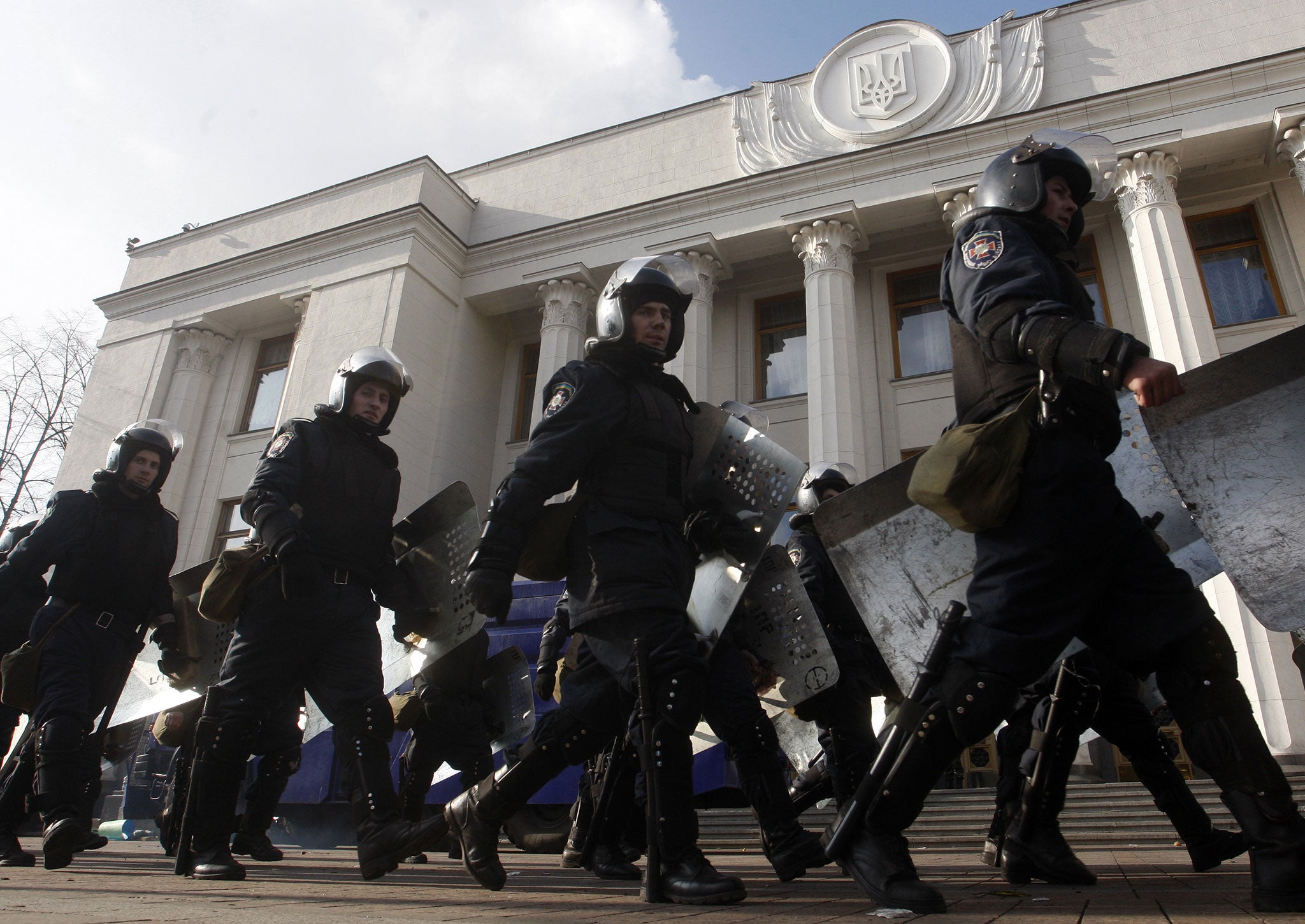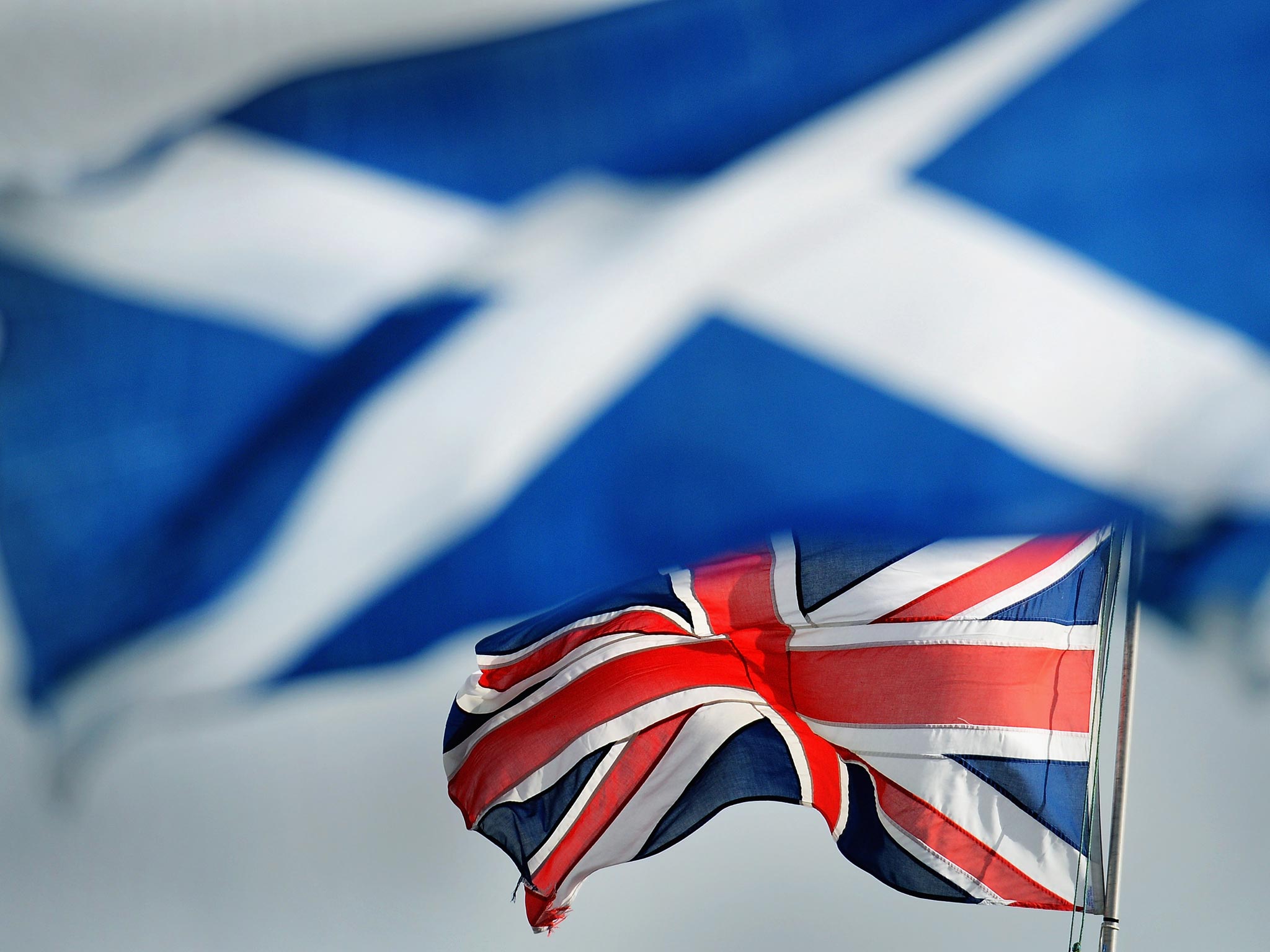Ukraine is a country divided against itself. Watch out, Scotland
If Scotland votes yes, supporters of the union will find themselves citizens of a country that commands none of their loyalty


Your support helps us to tell the story
From reproductive rights to climate change to Big Tech, The Independent is on the ground when the story is developing. Whether it's investigating the financials of Elon Musk's pro-Trump PAC or producing our latest documentary, 'The A Word', which shines a light on the American women fighting for reproductive rights, we know how important it is to parse out the facts from the messaging.
At such a critical moment in US history, we need reporters on the ground. Your donation allows us to keep sending journalists to speak to both sides of the story.
The Independent is trusted by Americans across the entire political spectrum. And unlike many other quality news outlets, we choose not to lock Americans out of our reporting and analysis with paywalls. We believe quality journalism should be available to everyone, paid for by those who can afford it.
Your support makes all the difference.One summer day in Kiev, I sat in Stalin’s private cinema. It was during a tour of the grandiose Neoclassical parliament building, the Verkhovna Rada, opened as a fig-leaf national assembly in 1939 at the height of Soviet state terror. In a basement room, the dictator, who dropped in fairly often, used to sit and watch films. Our party chuckled over this weird anecdote from the barbaric past.
How long ago those dark days felt, back then – in the middle of the last decade. Kids in orange T-shirts strolled through peaceful streets. Green parks spilled down to the broad river Dnieper in a sun-dappled city that local writer Mikhail Bulgakov called “a pearl in turquoise”. At a conference in the parliament, writers and academics mocked the EU for embracing their Polish cousins while, absurdly, consigning them to the savage East. Yet they believed that this gross error would be put right. And Ukraine’s recent revolution seemed unassailable.
This week, down the road on the Maidan and around Khreshchatyk Street, scores of sniper‑targeted protesters – about 100 dead – fell amid the flames and barricades of a virtual civil war. Battles raged outside the parliament. Yesterday, riot police briefly infiltrated the building itself as deputies debated President Yanukovych’s offer of early elections, a unity government and a return to the more balanced constitution of those optimistic days after 2004.
The Slavic goddess Berehynia, on top of the kitsch gilded column where I once met the droll and brave novelist Andrey Kurkov before we sloped off to a merry diplomatic party, now overlooks a killing field.
From Moscow, Putin cracks the whip and loads the guns of his tottering henchman. The European Union belatedly wakes up. Fragmented opposition forces lose touch with the surging anger of the “Euromaidan” rebels. In the pithy words of Ukraine specialist Andrew Wilson, the EU at first “took a baguette to a knife fight”. The foreign ministers’ troika from Poland, France and Germany has at last begun to put some beef into the European sandwich. But how did it ever come to this?
In hindsight, even then – during times of hope for a Western-oriented, fully democratic future after the Orange Revolution of late 2004 – there were warning signs to heed. Despite the official cult of Ukrainian promoted by the nationalists then in power, Russian still served as a lingua franca of the streets. At any meal, the façade of nationalist unity would start to crack and the unhealed rifts between Europhiles and Slavophiles – “right bank” and “left bank” Ukraine, after the flanks of the mighty Dnieper – begin to emerge.
After a few pepper-and-honey vodkas, over plump roast river fish, some of our hosts would – if they hailed from Russophile provinces – raise doubts about the validity of the new state that came into being in December 1991 amid the wreckage of Stalin’s Soviet empire. Culture mattered to them. But then, in these parts, it always does.
Glinting above the riverbank, the gold-domed monasteries of Pechersk Lavra recall the medieval heyday of Kievan Rus – the spiritual mothership of all Russian Orthodoxy, not just this patch of it. For pan-Slav thinkers, Ukraine remains, etymologically, the “borderland” of greater Russia.
A guy from the coal-mining, Moscow-backing Donbas told me of his outrage that the Russian classics should be taught as “foreign literature” in this city. In Kiev, where so many great Russian souls had lived and written!
Now a haunting museum, Bulgakov’s beloved family home – the setting of his novel The White Guard and play The Days of the Turbins – sits halfway down the winding, cobbled Andreyevsky Descent. Bulgakov loved his home town, but he called Kiev “a beautiful city, a happy city, the mother of Russian cities”. He was never remotely a Bolshevik. Still, Ukrainian nationalism repelled him as a primitive peasant throwback.
That backwoods chauvinism has shown its face in the current unrest. Late last year, the right-wing Svoboda (Freedom) party tried to hijack the uprising with posters of the pro‑Nazi wartime guerrilla leader Stepan Bandera. They remain a small minority among protesters. Most want “Europe” as a proxy or blanket term for accountability, transparency, democracy.
Even in the east, the Euromaidan has plenty of backers – although rallies there seem to express rage at the shameless kleptocracy of Yanukovych and his “family” more than any love of Brussels. See the website yanukovich.info for some solidly documented material on corruption among the ruling clique.
Breakdowns in legitimacy and breakdowns in governance run in tandem. If a large proportion of citizens feel that their state lacks values and authority, then what’s to stop a crooked elite from treating it as a private cash machine?
Ukraine’s divisions still run as deep as the Dnieper. If you credit a range of polls, support for the anti-government demonstrations since the abrogation of an EU co-operation deal on 21 November has stayed at or just under 50 per cent. Backing for the Yanukovych camp has hovered around, or just above, 40 per cent. In some parts of the west, fewer than 15 per cent wish to toe the Russian line; in the east, it’s a mirror image – with comparable figures.
Even if Yanukovych goes, Ukraine will still suffer its crisis of legitimacy. Yulia Tymoshenko, the former leader jailed in 2011 whose release the parliament agreed yesterday, still has enemies enough to derail any comeback. No unifying, pacifying figurehead – a Walesa or a Havel – lurks on the horizon. And Russian tutelage still has appeal for almost half the country.
Andrey Kurkov wrote recently: “Ukraine is a country where victory for any one side is impossible.” A trial of Yanukovych and his cronies “would look a great deal more elegant” than the current carnage, but “would be sanctioned by half the population”.
A house divided, we tend to think, cannot stand. But how much fundamental disaffection can a country take? This is not just a teaser for foreign-affairs buffs. After all, the United Kingdom – that ramshackle old jalopy of a polity, tied together with string and myth – is wheezing towards an abyss of its own.

Come September, the Scottish referendum presents a painfully perfect lose-lose scenario. Given a rejection of independence (still more likely), a thoroughly disgruntled 40-plus percentage of Scots will continue to press for devo max at the highest proof available. Now imagine a – far from impossible – “Yes” vote of 51 per cent or so, secured by cack-handed, backfiring pro-union interventions by everyone from Osborne to Barroso to Bowie.
No, we shouldn’t predict barricades on Princes Street or bonfires on the Royal Mile. Edinburgh will not burn like Kiev. Yet believers in a multinational state that has – despite or because of its anomalies – lasted since 1707 will find themselves suddenly thrown into citizenship of a country that commands none of their loyalty.
At least in the early of days of independence, half the country will not care to fly its new flag. Non-unionist Scots have long-practised skills in cultural separateness. For a large, restive unionist minority, the same would not apply. Have Alex Salmond and his team planned enough for the outcomes of a narrow-scrape victory? Without alarmism, it doesn’t seem absurd to direct them to the rocky history of post-Communist Europe. Secessionists who dream of Norway and Denmark should at least take a peek not just at Ukraine but into the long nightmare of Bosnia – shaken again this month by disintegrative protests.
We don’t need to travel that far to witness the lingering misery of botched state formation. This year is the centenary not only of the First World War but also of a local uprising against the authority of the British parliament. It happened in Ireland, yes. And Ulster Protestants were responsible.
When the passage of the third Home Rule Bill of 1912, giving de facto self-government to all Ireland, became inevitable, the country’s unionists rose in arms.
Edward Carson, the firebrand barrister-politician who had destroyed his fellow Dubliner Oscar Wilde in court, raised 100,000 rebels to fight against Westminster’s decision. At the Curragh, in March 1914, army officers mutinied. The Ulster Volunteers illegally imported rifles, while in the south, the Irish Volunteers – a core component of the later IRA – came into being to oppose them. At gunpoint, Carson won his Northern Irish statelet. Ireland descended into civil wars. That collapse of legitimacy drained and wounded both islands for almost a century.
Back in Kiev, Putin’s neo-Stalinist playbook – of remote-control repression via heavy-handed puppet regimes – has come to grief. He will not be welcome for a private screening in the Verkhovna Rada any time soon. As for Bulgakov, who lived through 10 coups in Kiev after the October Revolution in 1917, he came to loathe every bloody faction.
At the end of The White Guard, he voices the hope that “all this will pass. The sufferings, agonies, blood, hunger and wholesale death. The sword will go away, but the stars will remain… So why do we not want peace, and why are we reluctant to turn our gaze to the stars?”
Peace must mean that your home – however quarrelsome – stands firm. Bungle the architecture of statehood and the repairs may last for ever, and cost the earth.
Join our commenting forum
Join thought-provoking conversations, follow other Independent readers and see their replies
Comments